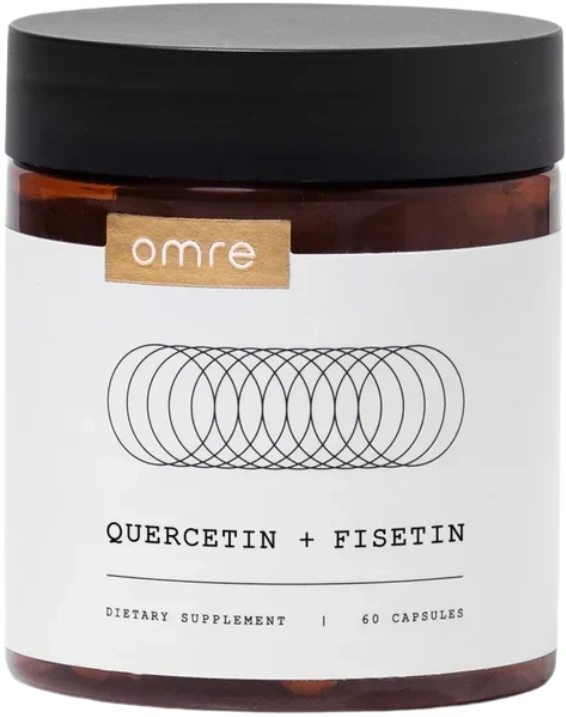Table of Contents
If you’re comparing CoQ10 vs Quercetin, you’re probably looking for ways to support your heart, boost energy, or manage inflammation naturally.
Both are powerful antioxidants with unique benefits for cellular health. CoQ10 helps your body produce energy inside the cells, while quercetin reduces inflammation and supports the immune system.
The best choice depends on what your body needs most, or you might find that taking both gives better results.
Key Takeaways:
-
CoQ10 helps the body produce energy and supports heart health.
-
Quercetin is a plant-based antioxidant that reduces inflammation and supports immunity.
-
Both offer significant health benefits for energy, heart, and cellular protection.
- Choose CoQ10 for energy and heart support, and Quercetin for inflammation and longevity.
Quercetin + Fisetin
Quercetin and Fisetin help manage 'zombie' senescent cell burden and support cellular rejuvenation.*
What Is CoQ10?
-v1762294134059.webp) CoQ10, short for coenzyme Q10, is a naturally occurring compound that your body makes to produce energy and protect cells from oxidative damage. It plays a key role in cellular energy production inside the mitochondria, often called the “powerhouse” of the cell.
CoQ10, short for coenzyme Q10, is a naturally occurring compound that your body makes to produce energy and protect cells from oxidative damage. It plays a key role in cellular energy production inside the mitochondria, often called the “powerhouse” of the cell.
CoQ10 works by helping enzymes create adenosine triphosphate (ATP), the main energy currency your body uses for every function, from heartbeat to brain activity (1).
Levels of CoQ10 naturally drop with age, which can lead to lower energy and slower recovery.
That’s why many people take CoQ10 as a dietary supplement for energy and cardiovascular wellness.
Key health roles of CoQ10:
Supports mitochondrial function and energy production
Helps protect the heart and blood vessels from oxidative stress
Strengthens antioxidant defenses against reactive oxygen species (ROS)
May help lower blood pressure and improve endothelial function
Reduces fatigue and supports exercise performance
CoQ10 is especially concentrated in energy-demanding organs like the heart, liver, and muscles.
It is also known for its cardiovascular benefits, particularly in people taking statin drugs, since these medications can lower natural CoQ10 levels. Common supplement forms include ubiquinone and ubiquinol, with the latter offering better absorption.
What Is Quercetin?
-v1762294347341.webp) Quercetin is a plant-derived flavonoid found in foods like apples, onions, berries, and green tea. It acts as a strong antioxidant that helps neutralize free radicals and reduce inflammation throughout the human body.
Quercetin is a plant-derived flavonoid found in foods like apples, onions, berries, and green tea. It acts as a strong antioxidant that helps neutralize free radicals and reduce inflammation throughout the human body.
Quercetin’s main strength lies in its anti-inflammatory and immune-supporting properties. It stabilizes mast cells, helps manage allergies, and may improve blood vessel function by reducing oxidative stress (2).
Researchers have studied quercetin for its role in supporting heart health, regulating inflammation, and promoting longevity (3).
Key health roles of Quercetin:
Acts as a strong antioxidant that protects cells from oxidative damage
Helps reduce inflammation and supports immune responses
May lower blood pressure and improve cardiovascular health
Supports brain and cognitive function by reducing oxidative stress
Provides natural allergy relief by stabilizing mast cells
Quercetin is often used as a dietary supplement for inflammation, immune support, and overall wellness. Because it has poor absorption on its own, it’s best taken with vitamin C, bromelain, or healthy fats to increase bioavailability.
Quercetin vs CoQ10: What Are the Key Differences?
The main difference between quercetin and CoQ10 is that quercetin is a plant antioxidant that reduces inflammation, while CoQ10 is a vitamin-like compound that helps your cells produce energy. Both have antioxidant activity, but they work through different mechanisms.
Together, both quercetin and CoQ10 can support overall cardiovascular wellness and cellular health, each contributing in different ways.
Quercetin vs CoQ10: Health Benefits Compared
-v1762296978032.webp) Both quercetin and CoQ10 have strong antioxidant properties and support heart health, energy, and longevity.
Both quercetin and CoQ10 have strong antioxidant properties and support heart health, energy, and longevity.
Disclaimer: This section is for informational purposes only and is not a substitute for medical advice.
Energy and Fatigue
CoQ10 directly supports cellular energy production by fueling the electron transport chain in mitochondria. It helps your cells produce ATP, which keeps energy-demanding organs like the heart and muscles functioning properly.
People with fatigue, mitochondrial dysfunction, or those on statins often benefit from CoQ10 supplementation (4).
Quercetin, while not an energy cofactor, helps reduce oxidative damage that slows energy production. It may enhance exercise performance by improving oxygen use and supporting mitochondrial biogenesis (5).
Best for: CoQ10 is better for energy and endurance, while quercetin helps reduce post-exercise inflammation.
Heart and Cardiovascular Health
Both support the heart and blood vessels, but they act differently.
CoQ10 improves cardiovascular health by helping the heart produce energy and by protecting cells from oxidative stress. Studies show it can improve symptoms in people with heart failure and may help lower blood pressure (6).
Quercetin supports blood vessel function by improving endothelial health and reducing arterial stiffness. It can also help manage chronic inflammation, a known risk factor for heart disease (7).
Best for: CoQ10 for improving heart energy and resilience, quercetin for circulation and blood pressure support.
Inflammation and Immunity
Quercetin acts as a natural anti-inflammatory by blocking NF-κB and COX-2 pathways that trigger inflammation. It also stabilizes mast cells, helping reduce allergy symptoms and chronic inflammation (8).
CoQ10 reduces inflammation indirectly by improving antioxidant defenses and lowering oxidative stress that contributes to inflammatory conditions (9).
Best for: Quercetin if inflammation or allergies are your main concern, CoQ10 if you’re managing oxidative stress or fatigue.
Quercetin + Fisetin
Quercetin and Fisetin help manage 'zombie' senescent cell burden and support cellular rejuvenation.*
Brain and Cognitive Function
CoQ10 supports cognitive health by protecting neurons and maintaining energy flow in brain cells. Research links low CoQ10 levels with cognitive decline and neurological diseases (10).
Quercetin helps reduce neuroinflammation and oxidative stress, which can protect against cognitive decline and age-related brain changes (11).
Best for: CoQ10 for mitochondrial brain health, quercetin for anti-inflammatory brain support.
Longevity and Aging
Quercetin may act as a senolytic, helping clear aged or damaged cells that promote chronic inflammation. This cellular renewal process supports longevity and healthy aging (12).
CoQ10 protects against oxidative stress and mitochondrial dysfunction, both key contributors to aging. It keeps energy levels steady and supports long-term cellular resilience (13).
Best for: Quercetin for anti-aging at the cellular level, CoQ10 for maintaining energy as you age.
Can You Take CoQ10 and Quercetin Together?
 Yes, you can take CoQ10 and Quercetin together, and in many cases, they work even better as a pair. CoQ10 supports cellular energy production while quercetin helps reduce oxidative stress and inflammation, creating a balanced environment for heart and immune health.
Yes, you can take CoQ10 and Quercetin together, and in many cases, they work even better as a pair. CoQ10 supports cellular energy production while quercetin helps reduce oxidative stress and inflammation, creating a balanced environment for heart and immune health.
Together, they provide complementary antioxidant protection. CoQ10 keeps your mitochondria running smoothly, and quercetin supports healthy inflammation responses.
This combination is especially helpful for people dealing with fatigue, cardiovascular concerns, or age-related inflammation. Always check with your healthcare professional if you take medications like blood thinners or statins.
Dosage and How to Take Them
Both supplements are safe for daily use, but consistency matters more than timing. Taking them with meals helps improve absorption and reduces the chance of stomach upset.
Typical daily dosages:
CoQ10: 100–300 mg daily, taken with food that contains healthy fats
Quercetin: 500–1000 mg daily, best taken with vitamin C or bromelain to improve absorption
It’s best to start at the lower end and adjust based on how your body responds. If you’re taking other dietary supplements or medications, ask your doctor before combining them.
Possible Side Effects and Safety
Both CoQ10 and Quercetin are considered safe for most people when taken within recommended doses. Mild side effects can occur, especially at high doses or when taken on an empty stomach.
Common side effects may include:
Mild nausea or digestive discomfort
Headache or dizziness
Temporary upset stomach if taken without food
Allergic reactions (rare, usually from plant-derived ingredients)
CoQ10 may interact with statin drugs and blood pressure medications, while quercetin may enhance the effects of blood thinners.
Always speak with a healthcare provider before starting new supplements, especially if you have chronic health conditions.
Who Should Take Which?
Both supplements offer many health benefits, but choosing one depends on your goals and current health needs.
Choose Quercetin if you:
Want to reduce inflammation or allergy symptoms
Are focused on longevity and cellular renewal
Need support for your immune system
Prefer a plant-based antioxidant
Choose CoQ10 if you:
Experience low energy or fatigue
Take statin medications for cholesterol
Want to support heart and cardiovascular wellness
Need help with exercise recovery or mitochondrial support
Some people take both for broader coverage, combining quercetin’s anti-inflammatory effects with CoQ10’s role in producing energy and protecting heart health.
Final Words
Both Quercetin and CoQ10 are powerful antioxidants that support your body in different ways.
Quercetin focuses on reducing inflammation and promoting immune balance, while CoQ10 fuels your cells with energy and supports cardiovascular health.
Together, they help maintain healthy aging, better energy, and improved resilience against oxidative stress.
If you’re looking for a high-quality option, Omre’s Quercetin + Fisetin formula is a great choice. It uses a phytosome form of quercetin for better absorption and pairs it with fisetin to help clear old, non-functioning cells for deeper rejuvenation.
It’s lab-tested, USA-made, and designed for real, evidence-based results. Try Omre’s Quercetin + Fisetin to support your heart, energy, and cellular health naturally.
Try Omre’s Quercetin + Fisetin to support your heart, energy, and cellular health naturally.
FAQs
Can I take quercetin and CoQ10 at the same time?
Yes, you can take quercetin and CoQ10 together. They complement each other well. CoQ10 supports cellular energy production, while quercetin helps reduce inflammation and oxidative stress. This combination is often used to support heart health and immune function.
Which is better for energy?
CoQ10 is better for energy because it helps the mitochondria produce adenosine triphosphate (ATP), the body’s main energy source. Quercetin can still help indirectly by supporting mitochondrial health and reducing fatigue from inflammation, but CoQ10 has a stronger effect on cellular energy.
Can quercetin replace CoQ10?
No, quercetin cannot replace CoQ10 since they work through different mechanisms. CoQ10 is vital for energy production and heart health, while quercetin mainly supports the immune system and reduces inflammation. Taking both provides more complete antioxidant and cellular support.
Are quercetin and CoQ10 safe for long-term use?
Yes, both are generally safe for long-term use when taken in standard doses. Research shows that quercetin and CoQ10 are well-tolerated, with few reported side effects. However, people taking blood thinners, statins, or blood pressure medications should consult a doctor before prolonged use.
Which foods are richest in each?
Quercetin is abundant in onions, apples, berries, and green tea, while CoQ10 is highest in organ meats, fatty fish, beef, and peanuts. Including these foods in your diet helps support your natural antioxidant and energy systems even without supplements.





